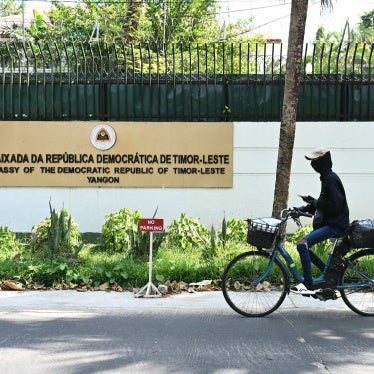The undersigned organizations express their deep concern regarding today’s announcement by Secretary of State Pompeo and other senior U.S. officials that the United States, among other things, has invoked emergency powers in order to threaten asset freezes and other punitive actions against officials of the International Criminal Court, their family members, and those who assist their investigations.
The ICC exists because it is difficult to hold government officials and other powerful actors accountable when they commit grave human rights abuses. That impunity, in turn, is corrosive to the broader rule of law, the prospects of lasting peace, and respect for the dignity of all. Since the ICC’s establishment in 2002 as a court of last resort, diverse coalitions of faith-based organizations, human rights advocates, legal practitioners, victims of atrocities, and other constituencies have often looked to it to complement and reinforce their work for justice. Like all other human institutions, the ICC has room for improvement. Nevertheless, from Uganda and the Central African Republic to Darfur and the situation in Bangladesh/Myanmar, the ICC continues to play a vital role, filling gaps in the justice system by independently investigating and prosecuting grave atrocity crimes when national authorities do not do so, or when they seek out help.
This is the context that makes the latest steps in the U.S. government’s attack on the ICC so alarming. It is unacceptable that the United States would target the judges, prosecutors, and other legal professionals of a court that more than 120 countries have joined – including U.S. allies in Europe, Latin America, Africa, and the Asia-Pacific region – using tools that are designed to stigmatize war criminals and disrupt terrorist networks. At this fragile moment in our country and globally, the U.S. government must find ways to address its stated concerns without alienating other countries that have supported international justice or signaling to those who may face the scrutiny of institutions like the ICC that intimidation is an acceptable means of avoiding accountability.
The United States can and should be a powerful voice for justice and accountability for mass atrocities. Punitive measures against the ICC diminish the credibility of that voice. We urge the administration to reverse the steps it has announced, and we urge members of Congress to clearly and publicly oppose this policy.
The Advocates for Human Rights
Alliance for Peacebuilding
American Civil Liberties Union (ACLU)
American Friends Service Committee
American Jewish World Service
Amnesty International USA
Anti-Torture Initiative, American University Washington College of Law
Center for Civilians in Conflict (CIVIC)
Center for Human Rights & Humanitarian Law, American University Washington College of Law
Center for Human Rights & Global Justice, New York University School of Law
Center for Victims of Torture
Center for the Study of Law and Genocide at Loyola Law School
Charity & Security Network
The Columbia Human Rights Institute
Congregation of Our Lady of Charity of the Good Shepherd
Cornell International Human Rights Clinic: Litigation and Advocacy
Darfur Women Action Group
Defending Rights & Dissent
Evangelical Lutheran Church in America
Fortify Rights
Freedom Forward
Friends Committee on National Legislation
Global Centre for the Responsibility to Protect
Global Justice Center
Human Rights Center, University of California, Berkeley School of Law
Human Rights First
Human Rights Institute, Georgetown Law
Human Rights Watch
The International Center for Transitional Justice
The International Criminal Court Alliance
The International Criminal Court Student Network
International Human Rights Center, Loyola Law School, Los Angeles
International Justice Project
J Street
Leitner Center for International Law and Justice at Fordham
Maryknoll Office for Global Concerns
National Advocacy Center of the Sisters of the Good Shepherd
Never Again Coalition
The Northwestern Pritzker School of Law’s Center for International Human Rights
Pax Christi USA
Peace Action
Philadelphia Bar Association
Physicians for Human Rights
Presbyterian Church (USA)
Project Blueprint
The Promise Institute for Human Rights at UCLA
Robert F. Kennedy Human Rights
The Sentry
Sisters of Mercy of the Americas – Justice Team
Syria Justice and Accountability Centre
Union for Reform Judaism
Unitarian Universalist Association
United Church of Christ, Justice and Witness Ministries
The United Methodist Church – General Board of Church and Society
United Nations Association of the USA
United Nations Association – Greater Philadelphia
Urban Morgan Institute for Human Rights, University of Cincinnati College of Law
Victim Advocates International
War Crimes Research Office, American University, Washington College of Law
World Federalist Movement – Institute for Global Policy
World Without Genocide at Mitchell Hamline School of Law








